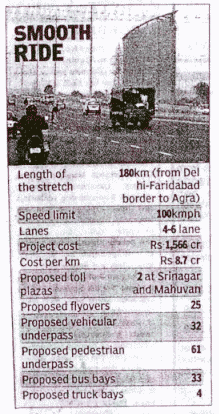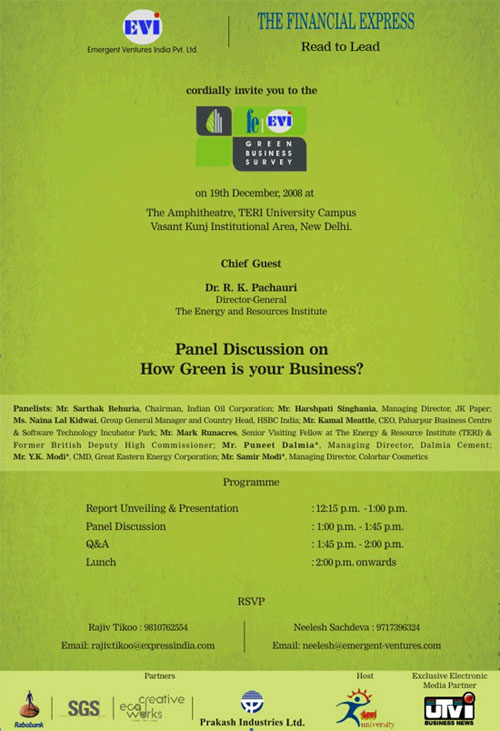An interview with Kamal Meattle about GreenSpaces appeared in the Deccan Chronicle (Hyderabad Edition) on December 19, 2008:
(click image to enlarge)
|
|
|
 Aug 20: NOT JUST A PANTRY – A GREEN PANTRY IN THE OFFICE Comments Off on NOT JUST A PANTRY – A GREEN PANTRY IN THE OFFICE
Aug 20: NOT JUST A PANTRY – A GREEN PANTRY IN THE OFFICE Comments Off on NOT JUST A PANTRY – A GREEN PANTRY IN THE OFFICE Aug 11: WHY PREFER BUSINESS CENTRES FOR CONFERENCES? Comments Off on WHY PREFER BUSINESS CENTRES FOR CONFERENCES?
Aug 11: WHY PREFER BUSINESS CENTRES FOR CONFERENCES? Comments Off on WHY PREFER BUSINESS CENTRES FOR CONFERENCES? Aug 5: OFFICE CAN EASE YOUR AFTERNOON EXHAUSTION Comments Off on OFFICE CAN EASE YOUR AFTERNOON EXHAUSTION
Aug 5: OFFICE CAN EASE YOUR AFTERNOON EXHAUSTION Comments Off on OFFICE CAN EASE YOUR AFTERNOON EXHAUSTIONThis is very good for GreenSpaces!
Soon, drive to Agra in two hours
3 Dec 2008, 2258 hrs IST, Dipak Kumar Dash, TNN
NEW DELHI: With the National Highways Authority of India (NHAI) inviting bids for the six-laning of Delhi-Agra stretch of NH-2, driving down to the Taj city may soon be a smoother and quicker ride. Once completed, it would take not more than two hours to cover the 180km from Delhi to Agra as the maximum speed on this stretch would be 100 kmph.
 NHAI sources said the date of the pre-bidding conference has been extended to December 18 and the revised last date of submitting bids has been fixed on January 12. The Rs 1,566 crore BOT project takes off from Delhi-Faridabad border, and traverses the districts of Agra, Mathura in Uttar Pradesh and Faridabad in Haryana.
NHAI sources said the date of the pre-bidding conference has been extended to December 18 and the revised last date of submitting bids has been fixed on January 12. The Rs 1,566 crore BOT project takes off from Delhi-Faridabad border, and traverses the districts of Agra, Mathura in Uttar Pradesh and Faridabad in Haryana.
“We are hopeful of good participation in the pre-bidding conference and of awarding the project soon. However, we are little skeptical of the impact of financial meltdown,” said a senior NHAI official.
For uninterrupted traffic flow on this proposed six-lane access control highway, NHAI proposes construction of as many as 25 flyovers at all the major junctions throughout the stretch wile the minor ones would be done away with. To meet the operational objective of maintaining uninterrupted flow of traffic without reducing the speed to accommodate entry, exit or cross movement of other traffic, there are proposals for construction of 32 vehicular and 61 pedestrian underpasses besides having 76 entry and exit points to the partially access-controlled highway.
Date: December 19, 2008
Time: 12 noon – 2 pm, followed by lunch
Venue: The Amphitheatre, TERI Campus, Vasant Kunj Institutional Area, New Delhi
Thank you to The Financial Express for including us on the panel!

![]()
Indians ready to pay more for environment friendly goods
Published 15 Dec 2008
NEW DELHI: Indians don’t mind paying more for environment friendly goods, compared to the Chinese or the Japanese, even though they are not unduly worried that the environment is in a crisis.
Thus, 88 per cent of Indian consumers are prepared to pay more for goods that are environment friendly against 82 per cent in China and 68 per cent in Japan, according to a study of consumers in India, China and Japan.
Findings are part of a 10-market global study by international communication firm Edelman.
Unlike their peers in other countries, respondents in India believe there is too much fuss about the environment (79 per cent) and they do not believe the world is experiencing global warming (56 per cent). Still, 92 per cent feel it is their duty to contribute to a better society and environment.
The study sought to understand consumer attitudes and preferences on the emerging issue of social purpose. Its findings show that despite the economic downturn, a strong majority think it is important to purchase products and brands they perceive to be socially responsible India (90 per cent), China (90 per cent) and Japan (64 per cent).
“What we find particularly interesting in this study is that economic concerns are taking a distant place behind consumers’ demands that quality brands be produced by socially conscious companies,” says Alan VanderMolen, Edelman’s Asia-Pacific President.
“The current economic crisis has made little or no difference to the financial or voluntary support given to good causes by Indians. We found that 23 per cent of Indian respondents have actually paid more for a brand because it supports a good cause.
About Edelman’s Good Purpose Consumer Study
StrategyOne conducted 6,048 interviews in 10 countries between August and October 2008. The study was an online survey of consumers, nationally representative of each of the country populations. For India and China survey was conducted as face to face and CATI respectively. Sample sizes per country are: US = 1006, China = 1000, UK = 522, Germany = 506, Brazil =500, Italy = 500, Japan = 502, India = 503, Canada = 502. France=507. The margin of error is +/- 5% for the Chinese, Indian and Japanese samples.